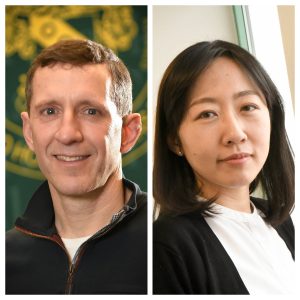Clarkson Professor and Chair of the Department of Mechanical & Aeronautical Engineering Brian Helenbrook and Assistant Professor of Chemical & Biomolecular Engineering Eunsu Paek have been awarded a National Science Foundation grant worth over $513,000 for their research project entitled “Horizontal Ribbon Growth of Single-Crystal Silicon.” The award starts September 1.
 Horizontal ribbon growth is the method of manufacturing single-crystal silicon wafers that can be used in high-efficiency solar cells. It has the potential to reduce the cost of the wafers by 75% compared to the current manufacturing process (Czochralski growth). Commercialization has been difficult, however, due to a lack of fundamental understanding of the physics that control this process.
Horizontal ribbon growth is the method of manufacturing single-crystal silicon wafers that can be used in high-efficiency solar cells. It has the potential to reduce the cost of the wafers by 75% compared to the current manufacturing process (Czochralski growth). Commercialization has been difficult, however, due to a lack of fundamental understanding of the physics that control this process.
This award supports research that will help further our understanding of the process. The team will work to develop a predictive model of horizontal ribbon growth of single-crystal silicon to reduce the time and costs needed for commercialization. This project is an opportunity to make significant, fundamental advances in the understanding of solidification kinetics and potentially lead to improvements in other crystal manufacturing processes.
The grant will promote the development of new U.S. industries such as LECT Inc. (Leading Edge Crystal Technologies) that are attempting to commercialize the process and contribute to workforce training in the areas of fluid mechanics, thermal engineering, and materials science.
See more details on this grant published by NSF here: https://www.nsf.gov/awardsearch/showAward?AWD_ID=1762802.
Clarkson University educates the leaders of the global economy. One in five alumni already leads as an owner, CEO, VP or equivalent senior executive of a company. With its main campus located in Potsdam, N.Y., and additional graduate program and research facilities in the New York Capital Region, Beacon, N.Y., and New York City, Clarkson is a nationally recognized research university with signature areas of academic excellence and research directed toward the world’s pressing issues. Through more than 50 rigorous programs of study in engineering, business, arts, education, sciences and the health professions, the entire learning-living community spans boundaries across disciplines, nations, and cultures to build powers of observation, challenge the status quo, and connect discovery and innovation with enterprise.